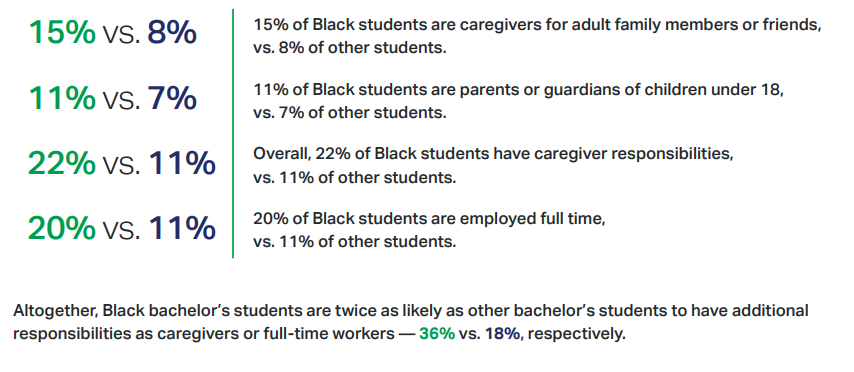Commentary
The Eye on Research blog will be on hiatus for March 2023 and will return in April. We will gather and keep track of relevant research released in March and include that content in the April edition.
Differing Perspectives on Preferred Class Delivery Modality and the Impact on SEM
A recent white paper by Anthology caught my attention this month; the paper's basis on a nationwide survey of current college students about various aspects of their college-going experience and career preparation. One of the questions asked about their
preferred class-delivery modality. Fully in-person classes are the least preferred, and asynchronous fully-online classes are the most preferred, especially among nontraditional students and students over 25. To me, this is a striking depiction of
a shift in class-taking behavior likely influenced by the COVID-19 pandemic and most institutions shifting to fully-online courses during that time. If these preferences hold over time, institutions focused on fully in-person classes will probably
find prospective students choosing to enroll elsewhere.
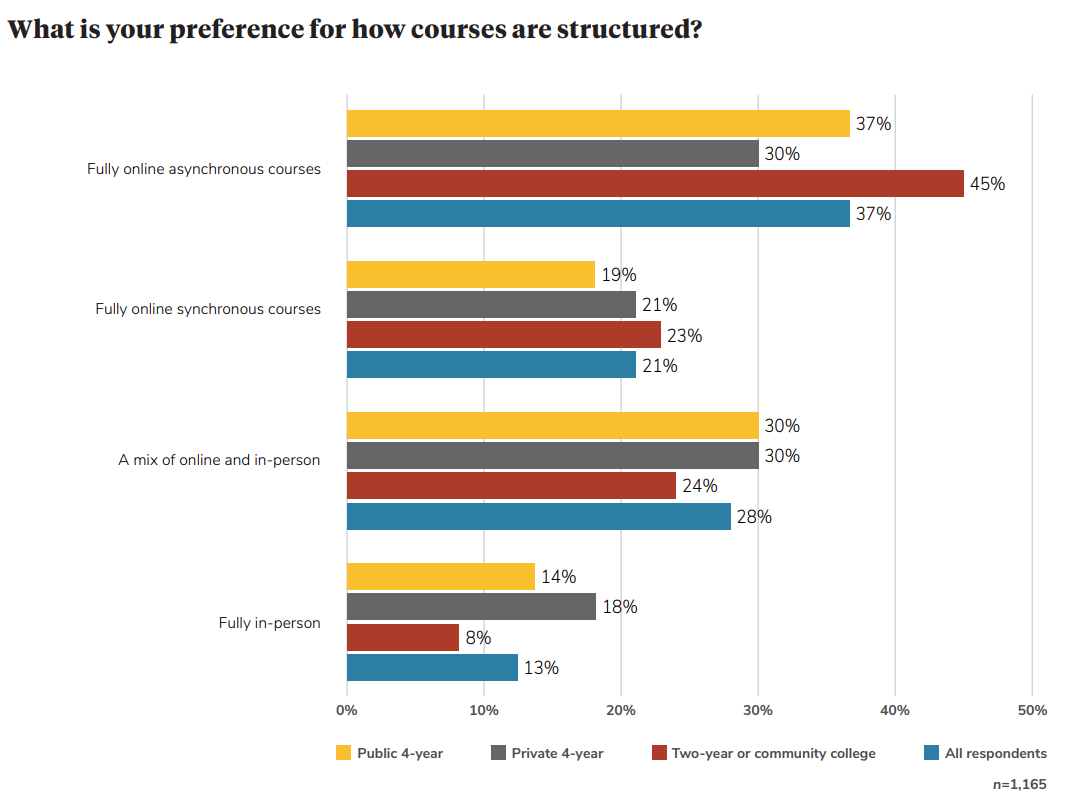 (Source: Nationwide student survey: opportunities to grow student success and career preparation)
(Source: Nationwide student survey: opportunities to grow student success and career preparation)In addition, current online students in the sample also hold high expectations for a response to an inquiry. The majority of online students expect to get a response from advisors, faculty, and student support offices within the same day; of those, roughly
one in five students expect a response in less than an hour.
On the other hand, according to a recent survey of prospective college students by Eduventures, two-thirds of high school juniors and seniors expect to take fully on-campus courses when they enroll in college.
Increasingly from these data, it is clear that institutions of higher education need to remain flexible in the number and type of class delivery modalities used. Access to, and use of, data on enrollment patterns will be necessary to produce a schedule
of classes that meets the needs of the diverse student population.
Call for Key Informant Interview Volunteers
Samantha Vargas Poppe, a consultant to the Lumina Foundation, is seeking volunteers to participate in key informant interviews about institutional policies, practices, and procedures on administrative holds at Hispanic Serving Institutions (HSIs) or emerging
HSIs.
While there is a movement to further research and lead action on this issue—including the No Holding Back project, a joint effort from AACRAO and WICHE—there are few formal programs for helping students mitigate stranded credits. Still,
institutional officials are likely addressing this issue on an ad hoc basis.
The purpose of these interviews is to produce case studies that will acknowledge the effort of HSIs or emerging HSIs to support students in freeing up stranded credits, either formally or informally. Ideally, interviewees are administrators or other staff
from an HSI or an emerging HSI responsible for developing or implementing policies, procedures, or other efforts to help students free up stranded credits due to administrative holds.
If selected, you will participate in an interview that will last one hour on a virtual platform. Interviews will be recorded, transcribed, and written up as individual case studies with flexibility on attribution or anonymity, depending on the interviewees'
wishes. Participants will receive a $50 Visa gift card.
If you are interested, please complete this short form. If you have questions about this project, please contact Samantha Vargas Poppe (samantha@equitymattersllc.com). Thank you for your consideration.
Call for Survey Volunteers: Jay Treaty Tuition Policies
Dear Colleagues:
My name is Michael O'Shea, and I am a Ph.D. Candidate at the Ontario Institute for Studies in Education (University of Toronto). My research explores tuition waiver policies at Canadian and U.S. universities for Indigenous students who live across the
U.S.-Canada border. The Jay Treaty of 1794 inspires many of these cross-border tuition policies. Examples include Vancouver Island University and the University of Saskatchewan.
I am surveying registrars and administrators at U.S. and Canadian institutions. If you agree, your part in the research is to participate in this brief online survey of your institution's tuition policies related to the Jay Treaty and Indigenous student
mobility. The University of Toronto's Research and Ethics Board has reviewed and approved the research. Your participation is anonymous and entirely voluntary, and you are free to decline to answer any question(s) you do not wish to answer unless
otherwise indicated. If you wish to withdraw from the study, simply close the survey before submitting your responses, and the study findings will not include your information. Once you submit your responses, deleting your information will not be
possible as the survey is anonymous.
Thank you very much in advance for your time and consideration. I am happy to answer any questions or discuss how the survey results may be relevant to you and your institution.
With gratitude,
Michael O'Shea
Ph.D. Candidate, Higher Education
Ontario Institute for Studies in Education
Cross-Border Fellow at the University of Victoria and Western Washington University
michael.oshea@mail.utoronto.ca
(773) 701-3786
AACRAO Research Update
2022 Chief Admissions Officer Career (CAdO) Profile
We have completed the analyses for the chief admissions officer career profile based on input from 374 individuals. The full report release date will be on or before March 1, 2023. In the meantime, here is a sneak peek at some key data.
From this year's participants, we have concluded that a typical CAdO:
- is more likely to identify as a woman;
- identifies as non-Hispanic, white;
- holds a master's degree;
- has been in higher education their entire career;
- has been in their current CAdO position for less than five years;
- reports to the division of enrollment management;
- came to the current position from another position within the same institution, most likely from the admissions office;
- works 45-49 hours a week;
- is responsible for recruiting and applicant-to-matriculation operations; and
- has changed institutions at least once.
February 2023 60-Second Survey
We received responses from 374 institutions in the United States for the February 60-Second Survey, made possible in part by sponsorship from Ad Astra. The focus of this survey was to benchmark institutional measures of effectiveness for the undergraduate
schedule of classes. The report release date is on March 15. Below are data point highlights.
- 87% of institutions apply one or more measures of effectiveness to the undergraduate schedule of classes
- Of those, 37% use standardized measures across the institution
- Most have access to the data they need to complete these measures
Future Research
We will engage with UPCEA and Modern Campus in late April to investigate the relationship between continuing and professional education and the registrar's office. We anticipate that the 2023 Chief Enrollment Officer Career Profile Survey will deploy
in the second quarter of 2023. We will also partner with a couple of our members to deploy a comprehensive survey related to stakeholder engagement and governance in curriculum management to support a chapter for the soon-to-be-updated curriculum
management book.
A special topic survey about how institutions provide service to adult learners will take the place of the April 60-Second Survey and will take about five minutes to complete. This survey will deploy in mid-March, focusing on undergraduate-serving institutions
in the United States.
Current Higher Education Research and Related Topics
Gender Imbalances in Academic Departments Affect Bias in Student Ratings
A new paper in Proceedings of the National Academy of Sciences describes how students may view faculty in departments with unbalanced numbers of men and women based on some gender bias. In the study, a department's gender composition and course levels
exacerbated gender biases in student evaluations; this affected women more, as many departments have a male gender majority.
Why Students Receiving Mental Health Services Withdraw from School
Pennsylvania State University's Center for Collegiate Mental Health published an annual report. It examined students receiving services at counseling centers using data from institutional counseling centers. Data collection includes 180 college counseling
centers and 4,688 clinicians. Key findings include:
- Freshman/first-year students with elevated levels of academic distress and a history of psychiatric hospitalization were 48% more likely to withdraw from school.
- Protective factors that reduce the risk of withdrawal from school include improvement in depression, generalized/social anxiety, and overall distress symptoms during services.
- If academic distress significantly decreased during counseling and students were also participating in extracurricular activities, they were 51% less likely to withdraw from school.
- Overall academic distress declined slightly in 2021-22, but it continues to be higher than it was prior to the pandemic.
Several Interesting Reports from the Community College Research Center
The CCRC has recently released several new reports. They include:
- An examination of the early effects of the pandemic on community college enrollment; this report focused on older adults (25+ years old), recent high school graduates (18–24 years old), and dually-enrolled high school students (under 18 years
old). Key findings include:
- Community college enrollment declines during the pandemic were not universal in their effect across states and colleges.
- Recent high school graduates (ages 18–24) experienced the largest declines in community college enrollment.
- High schoolers comprise nearly one in five community college students as dual enrollment grows (see map below).
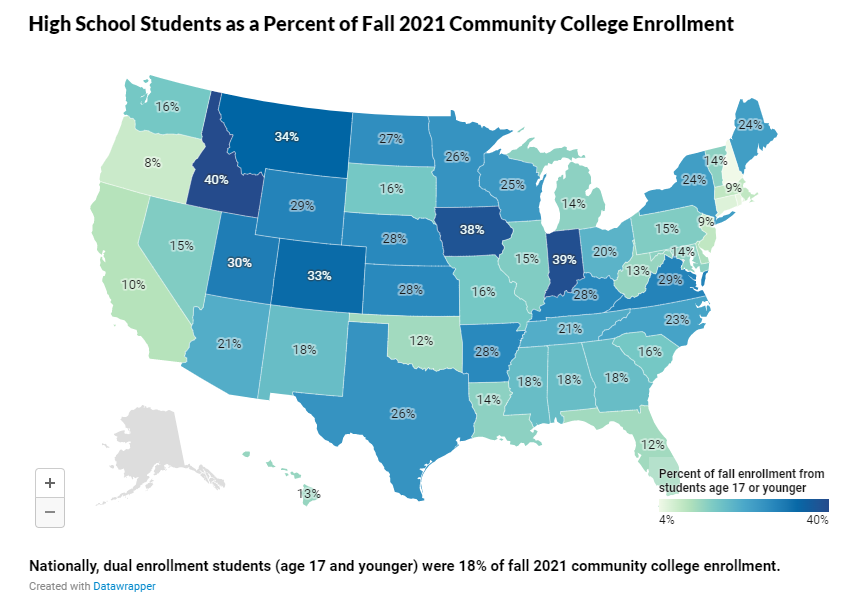
- A report on the early implementation and outcome findings regarding institutions implementing the Caring Campus/Faculty program. This program engages and coaches faculty in behaviors to increase students' connection to their college. Some examples
of behavioral commitments are below.
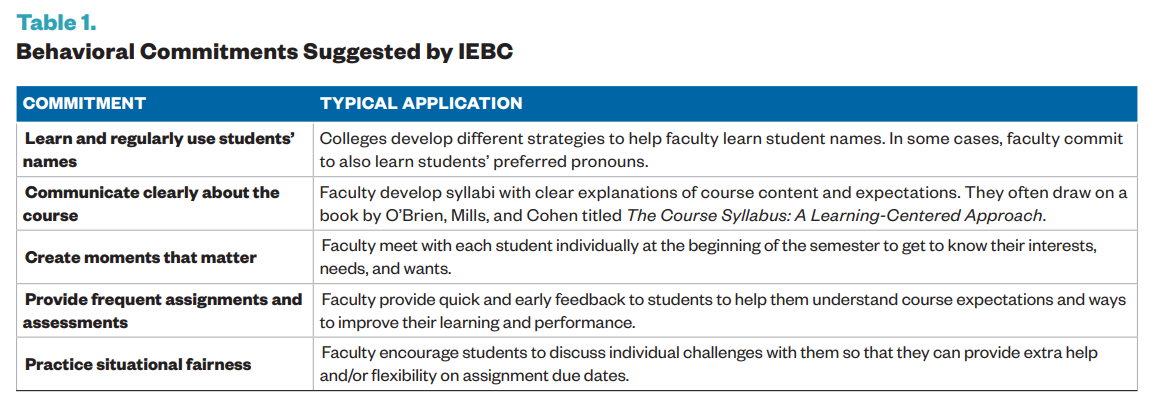 Source: Caring Campus: Faculty Leadership In Student Success - January 2023
Source: Caring Campus: Faculty Leadership In Student Success - January 2023
- A working paper discusses community college costs and the affordability of offering reduced-cost dual-enrollment courses. The article focuses on the financial sustainability of these programs and strategies to offer dual enrollment more efficiently.
High School Counselors Have a Large Impact on FAFSA Completion
A Data Point publication from the National Center for Education Statistics highlights the positive effects on FAFSA completion provided by high school counselors. The longitudinal study included more than 23,000 high school students. Key points include:
- For all students who planned to go to college, those who met with a high school counselor completed the FAFSA at a rate of 87% vs. 59% for those who did not (see figure on the right).
- There is some correlation between the educational level of parents and counselor meetings/FAFSA completion (see figure from the report on the right).
- A higher percentage of students who met with a high school counselor received need-based aid (67% vs. 45% for those who did not) and/or merit-based aid (32% vs. 30% for those who did not).
| 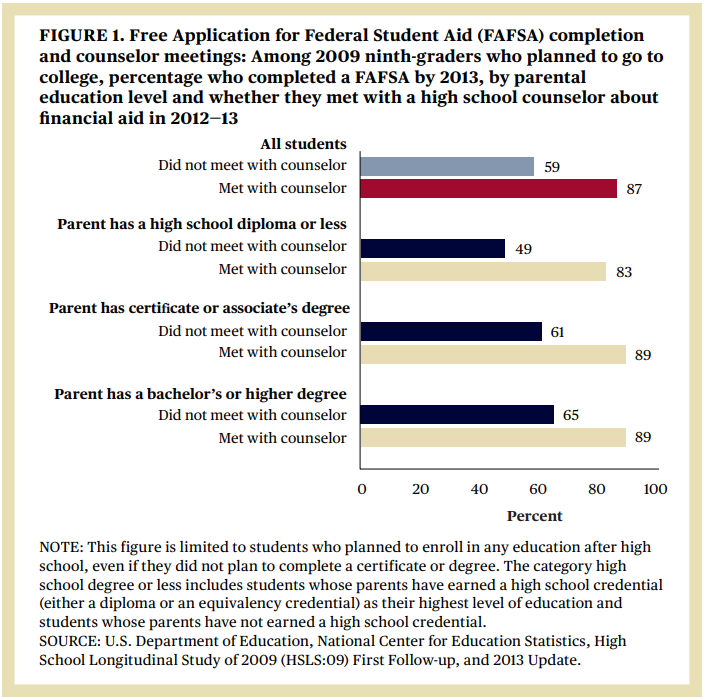 |
Discrimination and Other Challenges Continue to Affect Black Students
The Lumina Foundation and Gallup have released a new report titled Balancing Act: The Tradeoffs and Challenges Facing Black Students in Higher Education. The report examines discrimination and students balancing multiple priorities. Key points include:
- "Among all postsecondary institutions, 21% of currently enrolled black students say they feel discriminated against "frequently" or "occasionally" in their program, vs. 15% of all other students."
- Black students at less-diverse institutions experienced discrimination at higher rates.
- Black students in short-term credential programs experience discrimination at higher rates (32% in credential programs vs. 14% in bachelor's degree programs).
- The type of institution affects the rates of reported discrimination.
- 16% at public institutions reported discrimination frequently or occasionally.
- 23% at private, not-for-profit institutions reported discrimination frequently or occasionally.
- 34% at private for-profit institutions reported discrimination frequently or occasionally.
- Black students in four-year bachelor's degree programs are more likely to have additional responsibilities compared to other ethnic groups (see figure from the report below).
